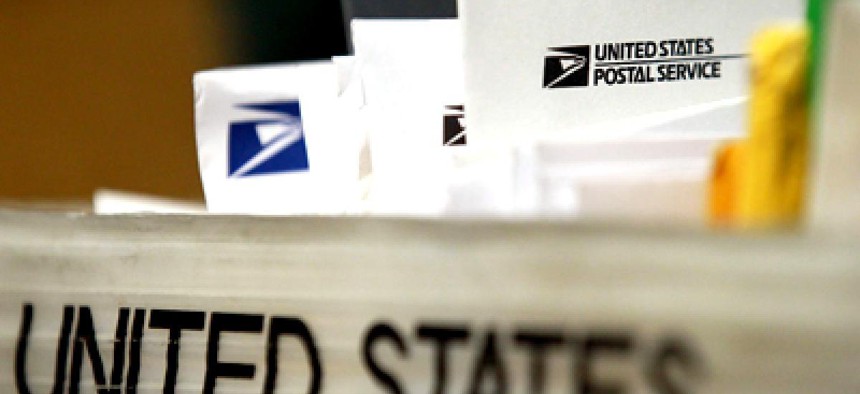
Justin Sullivan/Getty Images
Postal Service remains in limbo
Lawmakers approve extension for immediate cash obligations, but other proposals have yet to make an impact.
Major reform of the U.S. Postal Service will be on hold for the foreseeable future, as an array of proposals slowly work their way through Congress.
The latest continuing resolution to fund the government through Nov. 18 extends the Postal Service's deadline to make a $5.5 billion prepayment to its retiree health benefits account, originally due at the end of September. Officials have said they do not have the cash to meet that obligation and are hoping for legislative change that would allow USPS to restructure its finances and dig itself out of the red.
How that will happen remains to be seen, however. Postal officials are continuing to move forward with a plan to launch a separate health benefits program, and lawmakers this fall have added to the list of reform proposals up for consideration, all of which offer disparate solutions to the agency's financial woes. Disagreement continues over delivery day requirements, post office closures and workforce issues, including health and retirement benefits and employee layoffs. So far, only one bill has been marked up and moved forward.
The House Oversight subcommittee responsible for postal issues late last month approved a bill sponsored by Rep. Darrell Issa, R-Calif., that would allow USPS to drop a delivery day and adjust its labor costs by aligning pay and benefits more closely with other federal workers and the private sector, for example. It also would create an oversight body that could negotiate or modify existing union contracts and require layoffs to start with retirement-eligible employees. Sen. John McCain, R-Ariz., sponsored a companion bill.
Also on the House side is a proposal from Reps. Elijah Cummings, D-Md., and Stephen Lynch, D-Mass., that would refund a reported $6.9 billion Federal Employees Retirement System overpayment, offer early retirement and voluntary separation incentives, adjust retiree benefits prepayment requirements, and preserve employee protections set out in collective bargaining agreements. Lynch has a separate bill that would address a reported overpayment to USPS' Civil Service Retirement System account.
In the Senate, the Homeland Security and Government Affairs committee could examine pending legislation sometime this month. Sen. Tom Carper, D-Del., has a bill that would allow delivery day reduction and reduce pension funding requirements, while Sen. Susan Collins, R-Maine, has proposed changes to USPS' workers compensation program.
Sen. Max Baucus, D-Mont., on Tuesday introduced legislation that would give the Postal Service nearly $7 billion in cash relief to cover its obligation to prefund retiree health benefits. The bill would require the Office of Personnel Management to settle the FERS overpayment issue. Lawmakers also have asked the Government Accountability Office to investigate claims that USPS has overpaid CSRS.
Meanwhile, the Obama administration is pushing a plan that would allow the Postal Service to cut delivery days from six to five, provide two years of relief from employer contributions to the agency's Federal Employees Retirement System account and restructure obligations to prefund retiree health benefits. USPS also would have the flexibility to alter its retail network and adjust postage costs.
NEXT STORY: The New Look for Fall






